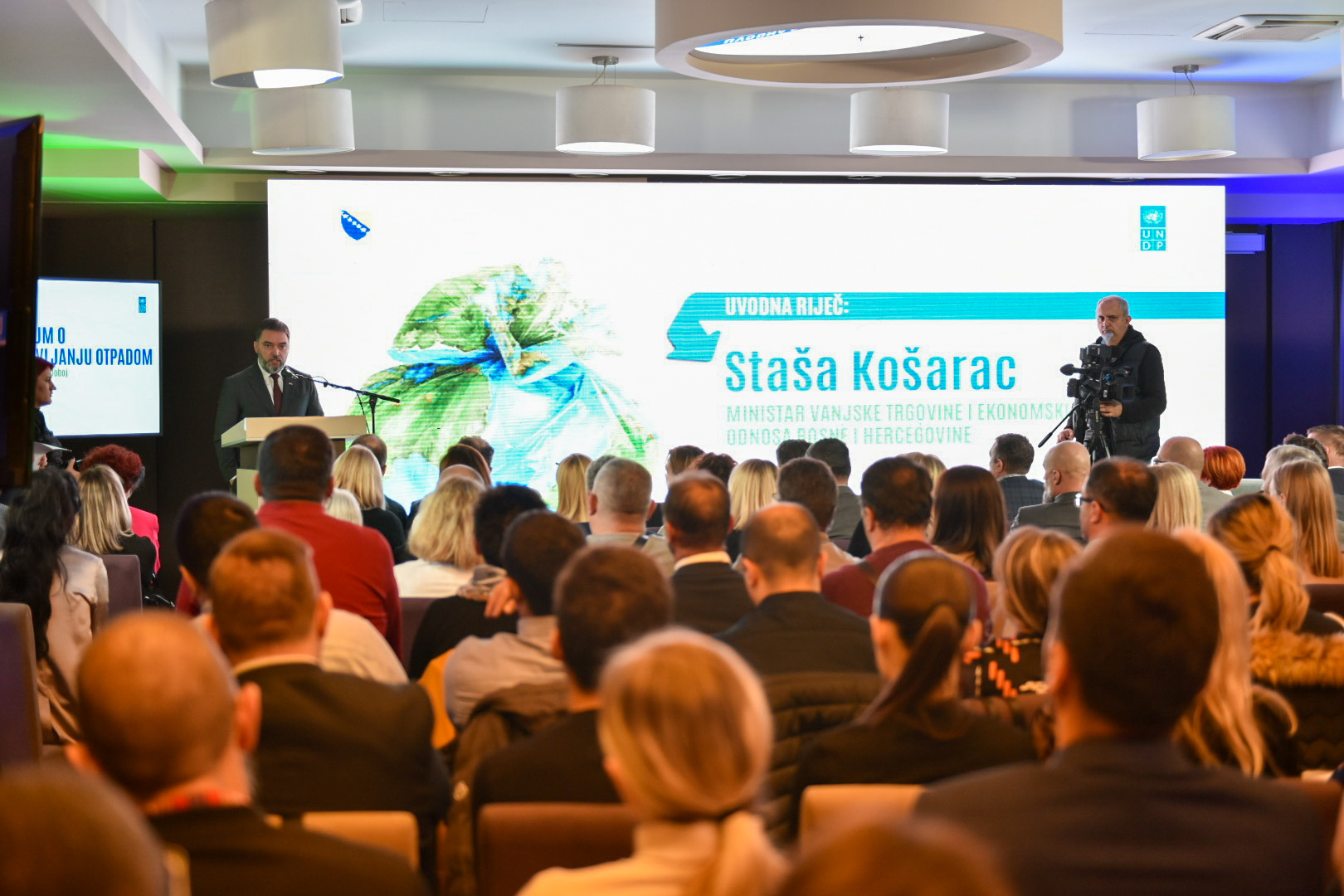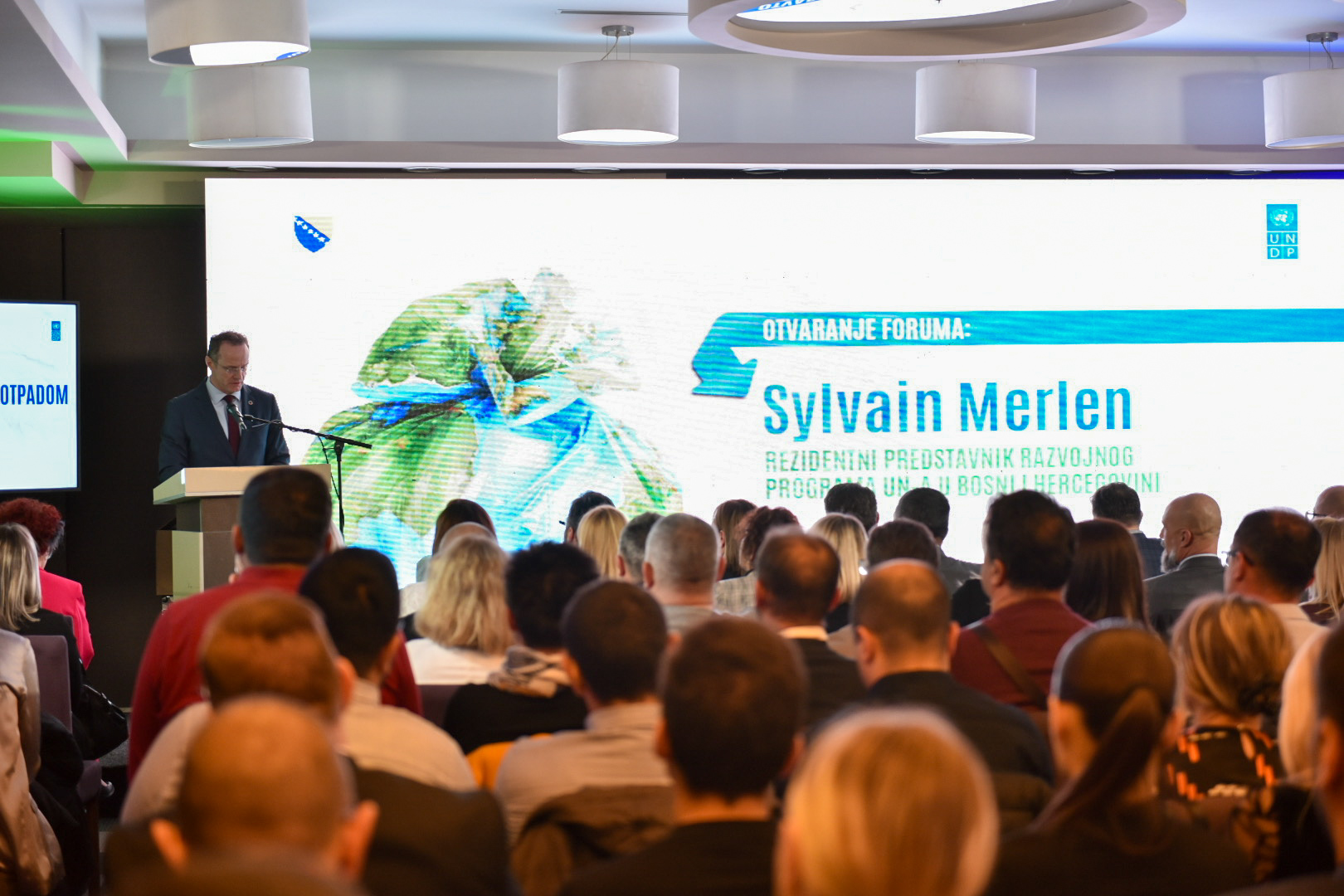UNDP in BiH organized the two-day Waste Forum in Doboj
Waste management as a development opportunity
November 23, 2023

During the two-day Waste Forum in Doboj, organized by the United Nations Development Programme (UNDP) in Bosnia and Herzegovina on 22 and 23 November 2023, in the framework of the European Week for Waste Reduction, more than 150 participants from various sectors, decision-makers, representatives of the private sector, civil society, educational institutions, local communities and international organizations, discussed the present and future of waste management in Bosnia and Herzegovina, with the aim to exchange experiences and ideas for addressing key challenges, from waste generation to waste disposal, and utilizing the potential of waste as raw material.

"It is important that we define our action, strategic and other plans in the future, given that Bosnia and Herzegovina, as a signatory to the Paris Agreement and the Sofia Declaration, committed to incorporate certain standards for environmental protection into its legislation. With regards to strategic documents, we are working intensively on the integrated climate and energy plan of Bosnia and Herzegovina in cooperation with all relevant entity bodies."The Minister of Foreign Trade and Economic Relations of Bosnia and Herzegovina, Staša Košarac, opened this event and emphasized the key role of waste management in environmental protection.
In Bosnia and Herzegovina, according to UNDP data, per capita waste production is lower than the EU average, but waste management practices lag behind the EU standards.

"Nowadays, waste is perceived not as a problem, but as a resource. When materials are reused - that is the first step towards a circular economy. This is a big, urgent, and complex issue, we need qualitative shift for new solutions and investments." said Merlen and added that ahead of COP28 at which the delegation from BiH will participate, it is important to note that waste and climate change are inseparable, as 12% of total methane emissions come from the waste sector.The UNDP’s Resident Representative a.i. in Bosnia and Herzegovina, Sylvain Merlen, underlined in his opening remarks the transformational potential of waste management, as an opportunity.
Not all citizens in Bosnia and Herzegovina have access to organized waste collection, particularly in uninhabited rural areas. According to the available data, only around 45% of the rural population has access to such communal services. On the other hand, the representatives of communal companies pointed out that they mainly have outdated vehicles and equipment, as well as that the price paid by citizens for waste removal is not economical.
Assistant Minister of Spatial Planning, Construction, and Ecology of Republika Srpska, Svjetlana Radusin, emphasized the importance of organized waste collection and compliance with the European principles of the waste hierarchy. "Some of the regional landfills in Republika Srpska do not meet a sanitary principles, but the Ministry and local self-government units are doing their utmost to establish a waste disposal system based on sanitary principles. It is necessary to educate the population about the use of energy for waste purposes. We have transposed some of the important directives in this area and harmonized the legislation with EU requirements, but the implementation on the ground needs to be improved."
There are over 1,400 illegal waste disposal sites in Bosnia and Herzegovina, while only one landfill meets technical and other standards, it was stressed at the Waste Forum. Additionally, there is no industrial or hazardous waste disposal site in the country, hence the need to establish a more advanced hazardous waste management system.
Assistant Minister of Environment and Tourism in the BiH Federation, Mirsad Ibrović, presented the plans and projects of this Ministry for waste management in the BiH Federation and, among other things, pointed out: "Hazardous waste is currently mostly exported to European Union countries for permanent disposal, which ultimately represents an expensive process due to transport and other costs related to transboundary transport of waste. Strengthening domestic capacities for the disposal of hazardous waste is also our strategic priority. I will give you just one piece of information that this year the FBiH Ministry allocated two million KM from its budget for the remediation of hazardous waste "crux" in Tuzla from the former HAK facility, and we will continue to do so in the future."
In addition to analyzing aspects of waste management, the Forum also provided better insight into various segments of this issue through panel discussions and field visits.
As an example of good practice in waste management in Bosnia and Herzegovina, the Public Company "Eko-Sep" - Center for Waste Management in Živinice was presented, in which over eight million KM were invested from international and domestic sources. The participants also visited good example of the Omorika recycling company in the vicinity of Doboj, as well as the unsanitary regional landfill in Doboj.
The Forum concluded with an invitation to all relevant stakeholders to work together on an integrated waste management system, with the primary goal of reducing the total amount of communal and waste generated from production activities, and with recommendations for strengthening the waste management system, introducing a deposit system for returning packaging, and establishing facilities for the treatment of different types of waste. It was also concluded that greater attention of society is needed towards waste circularity and good disposal practices, as well as increased awareness of the health and environment impacts of improper waste management.

 Locations
Locations











